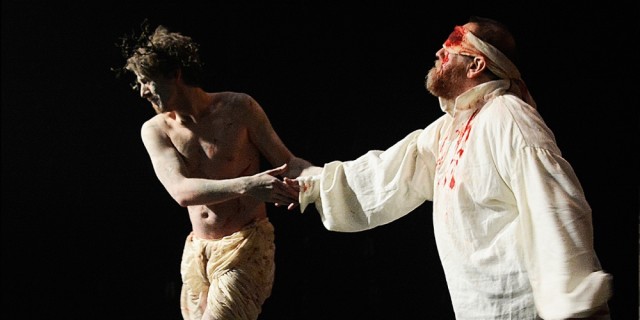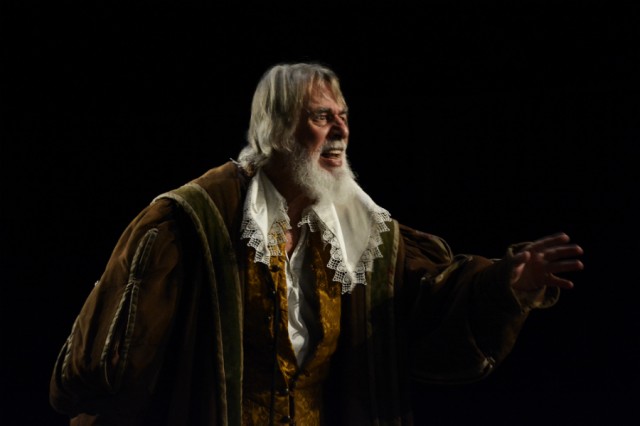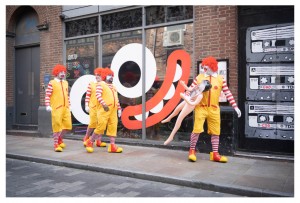“A monument of craft and humanity”: Northern Broadside’s King Lear — Reviewed
Absurdist drama and compassionate direction: a new touring production of King Lear by an all-northern cast draws as much goodness as it can from the tragedy, finds Joshua Potts…
Nihilism is a tough sell at the best of times. The trajectory of a world without God, where goodness fails to rescue friends and family hovering at the flame, is beyond the capabilities of most poetry. Nature’s presence at the edge of mankind – the vengeful Mother, stripping war and legacy to wisps of futile ash – is a source of conflict that can make us ashamed to have ever crawled from the ocean, sprouted brains, and led us to evolve and plot our way out of a simple fact: death is coming.
It may not like us because we have ignored it at every turn. We will return to the earth and the earth hates us for it. As our planet rages to the tune of bushfires, mass-flooding and dwindling natural resources, the primacy of that idea burrows into civilisation like a worm in a rotten apple.
Shakespeare understood that lineage is a way to create our own little gods, to ease the passage. King Lear is his greatest case for the dying of the light, and the Northern Broadside theatre company has attempted a staging that bottles all the goodness it can. The result is a production that feels, hears and runs from the worst side of ourselves, forgoing resignation for a sort of horrified bafflement.
Much of the play’s power lies in its quieter moments. The word ‘nothing’ thrums across every conversation, a Russian doll of interpersonal significance. Appropriately, Isabella Bywater’s stage design is nothing more than a bare curtain pole erected over a platform, a banner coiled at the top corner, establishing a power vacuum with economy, little fuss.
Emptiness, by its very definition, requires potential things to fill it, and Shakespeare gives us several: Goneril (Helen Sheals) and Regan (Nicola Sanderson), inheritors to the crown, are determined to purge themselves of their father, absorbing sister Cordelia’s (sensitively played by Catherine Kinsella) divested share of the kingdom for nefarious ends.

The opening scenes have a believable, frustrated sense of retirement. Barrie Rutter’s Lear is both warm and petulant, unaware that he is handing himself over to the mercy of monsters, the “serpent’s tooth” of ungrateful children. He is the carcass to be picked clean, anchoring the predatory movements of Edmund (Al Bollands) and Lear’s daughters, a force of will bent low to the dirt.
The role requires an actor of considerable strength to imbue Lear’s lines with the weight they deserve; luckily, in Rutter, they show a character who’s fragility extends to his mind alone, a man of intention who bristles with fear at the sordid disservice of old age.
Rutter is the founder of the company, so it’s a given that he’s picked one of the plumiest roles in theatre for his own. The rest of the troupe do well to hold their own around him. Fine Time Fontayne is a riot as the Fool, prancing and leering with a dancer’s physicality, brazenly satirising his master’s belief that things must work as they should, a fun-house mirror for Lear to knock against.
A surprising thread of comedy is squeezed from the play’s first half, as the banished Kent (Andrew Vincent) spars with Oswald (Jos Vantyler), who has been coiffed to Morrissey levels of ludicrousness. For a play with such a reputation for heavy subject matter, this side of the production is a breath of fresh air, slipping easily from the mouths of an all-northern cast.

Yes, I’m drawing attention to it – Shakespeare is so often boxed into wobbly breast-heaving and the tongue of middle England that, even as a cursory mention, a different flavour is worth talking about. There shouldn’t be a need to conflate perspective with location, but Northern Broadside inevitably has a blunt, declarative approach, fortifying the impact of those delicious sentences.
Director Jonathan Miller makes a relatively straight-forward stab at conveying the erosion of the parent-child bond. Edmund has a cocksure wink in his eye that never goes away, paling mightily under the range of brother Edgar’s (Jack Wilkinson) emotions and the broken, noble Earl of Gloucester (John Branwell). There is hardly an instance of apocalyptic venom: when a crucial scene demands Lear to wish his eldest daughter was barren, Sheals looks as if she’s been told Antiques Roadshow has been rescheduled; we are also spared the horror of the eye-gouging sequence in the third act, which takes place behind a screen of smoke and strobe lighting.
A touch more madness, vitriol and earth-shaking denouncement would’ve been nice, yet the compassionate direction emphasises a core of life that these characters are trying to hang onto, and make decisions seem spur of the moment rather than premeditated on cruelty.
As ever, the play is allowed to experiment in its traumatic middle section. After a break we sit down and return to Lear on the heath, thunder cracking overhead as the stage transforms into a den of dim rebuttals to the dark. Fontayne stands shivering, slumped in a large coat, wearing a grimace slapped with makeup. For anyone who doubts Shakespeare’s contribution to absurdist drama, they might consider the image of a king, a jester, and a madman crowned with thorns trading philosophy like scraps of food – better yet, the simulated rebirth of a blinded Gloucester is as tender as one can ask, reminding us that modern playwrights (Beckett chief among them) have viewed King Lear as Patient Zero for tragi-comic metaphor.
The fancifulness of the heath scene is echoed in Edmund and Edgar’s climactic fight, performed in slow-motion. It’s enough to raise eyebrows after Miller’s directorial adherence to the basic groundwork of the text, but by this point he’s earned it.
So we have what we have: an understated interpretation of a brilliant piece of writing; one of the pinnacles of actorly testament, delivered for the widest possible audience. The devastative meanness of Lear may be lost, but what stands in its place is a monument of craft and humanity, daring to reach into the heart of darkness and pluck a string or two.
Joshua Potts
Joshua saw King Lear at the Liverpool Playhouse; it now continues to tour at the following UK venues:
The Lowry, Salford Quays, now until Sat 9 May 2015 (Box Office: 0843 208 6010/Group Bookings: 0843 208 6003)
York International Shakespeare Festival, University of York, Heslington East Campus, Tue 12-Sat 16 May 2015 (Box office (York Theatre Royal): 01904 623 568)
Rose Theatre, Kingston, Tue 19-Sat 23 May 2015 (Box Office: 020 8174 0090)
New Vic Theatre, Newcastle-under-Lyme, Wed 27 May-Sat 13th June 2015 (Box office: 01782 717 962)





